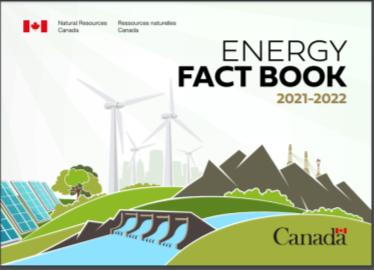Contributed by Robert Lyman © 2021. Robert Lyman’s bio can be read here.
Every two years, Natural Resources Canada publishes the Energy Fact Book, a compilation of statistics about Canadian energy supply, demand, trade and related topics. I previously reviewed the Energy Fact Book 2018-2019, and was impressed by how many of the facts, honestly and accurately reported by the department, contradict the usual storylines of those who claim that environmental, and especially climate “emergency” considerations should govern energy and environmental policy decision-making in Canada. I now have reviewed the 2021-2022 edition of the Energy Fact Book, which can be found here:
I offer this selection of factual highlights from the book in contrast to the usual claims of climate alarm.
Energy and the Economy
Claim:
Energy is not a major contributor to Canada’s income, especially outside of Alberta.
Facts:
While the energy sector GDP in Alberta in 2020 was the highest in Canada at $59.6 billion, it was significant in all provinces, including notably Ontario ($15.6 billion), Quebec ($12.0 billion), British Columbia ($11.8 billion) and Saskatchewan $10.5 billion).
Claim:
The energy industry does not contribute much to government revenues.
Facts:
The average annual government revenue from the petroleum sector over the period 2015-2019 was $13 billion. Of this, the upstream extraction and support industries accounted for $10 billion. The energy sector’s share of total taxes paid by all industries was 6.9 %.
Claim:
Renewable energy accounts for a large share of Canada’s primary energy production.
Facts:
Of Canada’s primary energy consumption in 2019, crude oil, natural gas and natural gas liquids accounted for 71% of the total, uranium 16%, coal 5%, hydro 5%, and other renewables (biomass, wind and solar) 3%. Excluding uranium, fossil fuels accounted for 76% of Canada’s total primary energy supply in 2019, biofuels and waste 4% and wind and solar 1%.
Claim:
Renewable energy sources constitute a large source of employment compared to the petroleum and traditional electricity generation industries.
Facts:
Canada’s energy sector is a capital-intensive, not labour-intensive part of the Canadian economy. In 2020, 4.7% of total direct and indirect employment was in the energy sector; of this, 1.6% of employment was direct: 1.0% in petroleum, 0.6% in electricity and 0.1% in others (including renewable energy generation).
Claim:
Energy exports are not an important part of Canada’s trade.
Facts:
Energy exports in 2020 represented 18% of total Canadian goods exports, considerably higher than motor vehicles and motor vehicle parts, the second-largest category.
Claim:
Most of Canada’s oil imports comes from Middle East dictatorships.
Facts:
In 2020, 78% of Canada’s oil imports came from the United States, 3% from Norway and 1% from Colombia. Thirteen % came from Saudi Arabia and 4% from Nigeria.
Claim:
Electricity is a more important destination for energy investment in Canada than oil and gas extraction.
Facts:
In 2020, oil and gas extraction was the largest area of capital expenditure in the energy sector, at $21.7 billion, followed by electric power generation and transmission at $21.2 billion.
Claim:
Electricity accounts for the largest share of the value of major energy projects planned in Canada.
Facts:
In 2021, there were 305 planned (announced, under review, or approved) energy projects worth $449 billion, and 97 projects under construction worth $139 billion. Oil and gas sector projects accounted for the largest portion of project value, $336 billion.
Emissions Trends and Decarbonization
Claim:
Carbon capture and storage represents a large number of “clean technology projects”.
Facts:
There were two carbon capture and storage projects in Canada underway in 2017 and 2018, one in 2019 and none in 2020 and 2021.
Claim:
Canada’s secondary energy use by fuel type can be quickly converted to 100% electricity and biomass.
Facts:
Electricity and biomass combined in 2018 accounted for 26% of secondary energy use; 74% were oil, natural gas and other products.
Claim:
Eliminating natural gas would have no major impact on Canada’s end-use energy economy.
Facts:
In 2018, natural gas supplied 53% of residential heating use, 70% of water-heating use, 19.4% of commercial sector use and 43% of industrial sector use.
Claim:
Fuel use in the transportation sector is declining.
Facts:
Transportation energy use increased 26% from 2000 to 2018.
Claim:
Canada could shut down the oil sands at acceptable cost.
Facts:
The capital investment in the oil sands to the end of 2020 was $332 billion.
The oil sands provide 97% of Canada proved oil reserves.
Claim:
Canada has not done well in reducing GHG emissions per capita.
Facts:
From 2000 to 2016, Canada’s GHG emissions declined by 23% per dollar of GDP and by 18% per capita.
Oil sands
Claim:
The GHG emissions intensity of production from the oil sands is increasing.
Fact:
From 2000 to 2019, oil sands emissions per barrel decreased by 33%.
Claim:
The oil sands are a large part of global emissions.
Fact:
The oil sands account for 0.1% of global GHG emissions.
Claim:
Oil sands production takes up too much land.
Facts:
The total area being mined for oil sands is 901 square kilometers. That is 0.009% of Canada’s area.
Electricity Generation
Claim:
Fossil fuels are not important for electricity generation in Canada.
Facts:
Here are the shares of electricity generation provided by coal, natural gas and oil by province and territory in 2019:
Nunavut: 100%
Alberta: 89 %
Saskatchewan: 81%
Nova Scotia: 76%
NWT: 50%
N.B.: 28%
Ontario: 7%


good summary. I hope the feds take notice, and correct their errors.
People who trust the mainstream media are never told these facts. I hope people wake up before the costs become unbareable.
Trudeau and his cabinet need to see this now before they destroy the energy industry.
Thanks for this – a useful report which the Thunberg/Suzuki crowd will hate. Keep up the good work and Happy New Year!